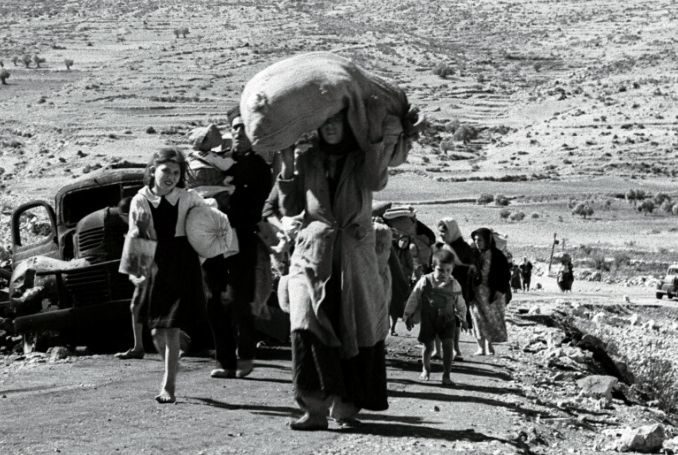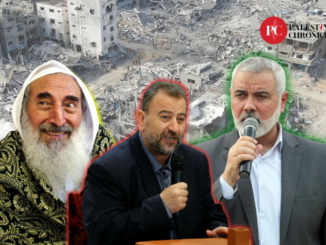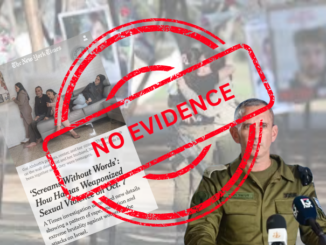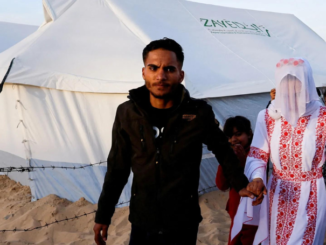
By Benay Blend
In Louise Erdrich’s latest novel, a fictionalized version of her Chippewa grandfather’s struggle for his people, the night watchman, of the title’s name (The Night Watchman 2020), battles against House Concurrent Resolution 108 (HCCR), a bill to (ex) terminate the Turtle Mountain Band (among others) of Minnesota.
Because Thomas Wazhashk’s father Biboon had “for years…understood that time was all at once, back and forth, upside-down”, it’s conceivable that space exists that way too, so that the Palestinian experience of 72 years of colonization connects in many ways to the struggles of Native people on Turtle Island.
Nick Estes, a member of the Lower Brule Sioux tribe, assistant professor of American studies at the University of New Mexico and co-founder of The Red Nation (TRN), makes this clear in an interview with Yoav Litvin for Truthout: “The primary organizing principle of a settler society is the elimination of the Native, whether it is in Palestine or the United States.”
Interviewed also by Litvin, Justine Teba, of the Tesuque and Santa Clara Pueblo and co-founder of the Pueblo/a/x Feminist caucus within TRN, adds that “it is crucial to remember our struggles are global,” all part of the same settler-colonial scheme.
In an article entitled “The Native American Model of Palestine’s Future,” Steven Salaita speaks further to the collapsing of the time factor:
“We needn’t set Natives and Palestinians against one another in fixed iterations of linear history. It’s better to participate in the timeless models of resistance that disturb settlers on both sides of the Atlantic.”
As Ilan Pappe noted two years ago, the correct term to label May 15 is “al-Nakba al-Mustamera,” the ongoing Nakba, which describes over 70 years now of continuous struggle against the Zionist state. “They always have a plan,” Biboon tells his son, referring to over 500 years of schemes to rob the Indigenous of their lands.
For Native people, then, and in particular the Chippewa, there has been one thing about another, culminating for the Chippewa in HCCR. Roxanne Dunbar-Ortiz explains that this 1953 legislation sought to “liberate” Indians from the oppressive control of the federal government by transforming reservations into private ownership that could be bought and sold at will. In return, the government sought to relocate Indians to major cities, where they could compete–or not–for jobs in true “free market” fashion.
Couched in words like “emancipation,” HCCR was intended to do just the opposite, “liberate” Native people from their land so that it could be more easily grabbed from the surrounding population. For Palestinians, land theft has been more overt, as in the latest plans to annex the entire West Bank. Nevertheless, Israel’s Memorial Day, a commemoration that honors Israelis who have died in the “conflict,” has for the past 15 years been the occasion for a Joint Israeli-Palestinian Memorial Ceremony organized by Combatants for Peace and Parents Circle-Families Forum.
Similar to the language of the Termination Act, in which words like “emancipation” that really mean the opposite, both fall perhaps within the broader context of “normalization,” defined by Haidar Eid as “events and activities that portray the relationship of colonial oppression, which is inherently abnormal, as if it were normal.” According to its organizers, the joint ceremony challenges the “traditional narrative of victimhood and separation,” by promoting an acceptance that “war is not an act of fate—but a human choice.”
While the termination bill glosses over inherent land theft, both past and present, the Israel-Palestinian ceremony neglects to mention that it is Israeli apartheid that has led to separation, and more importantly, perhaps, that war has not been the choice of the colonized, who indeed are victims engaged in a struggle for liberation. “The colonial violence that breeds death and bereavement is set aside” observes Lana Tatour, “in favour of what is seen as a powerful presentation of a humanist vision.”
Moreover, Tatour charges that the “collaborative branding” of the event is a “false narrative,” promoted by liberal Zionist groups who make it very hard by its very location for Palestinians to attend. Just as the Chippewa delegation many decades before found it difficult to go to the Washington hearings, due to financial reasons, among others, Palestinians also have obstacles to any kind of travel. Not only do they lack the fiscal means to attend but also those who come from the occupied West Bank must obtain entry permits from the Israeli government.
The mantra of Combatants for Peace appears to be “there is another way!” But there is only mention here of peace with no thoughts of justice, a space that is most likely not left accidentally blank. If pressed the group promotes the two-state solution, but that end game has been dead for many years.
Events like the memorial-day ceremony are perpetuated to ensure that at the conclusion everyone leaves feeling good for having participated in an occasion that offended no one with words like “colonial” or “apartheid.” “The ceremony may provide catharsis for the guilty liberal conscience,” Tatour concludes, “but it does little for the oppressed. Bereavement and suffering do not happen in a vacuum; they are political.”
“Survival is a changing game,” Biboon tells his son. Thus, after 500 years on for Native people, and 72 for Palestinians, Pappe suggests a term that he fears “outdated” to describe what he feels might bring “peace and reconciliation” to Israel/Palestine: decolonization. At the time that he was writing, the One State Foundation was just beginning, as was TRN in the United States.
“People often assume that Natives have been permanently dispossessed or exist as ahistorical monuments of conquest unable to access modernity,” Salaita notes, “if they exist at all.” Because of this conjecture, those aware of the colonization of Palestine often feel that Natives should avoid following in their footsteps.
As Erdrich’s novel shows, this is not the case. Thomas Wazhashk, modeled after Patrick Gourneau, Erdrich’s grandfather, along with others successfully fought against the termination of the Turtle Mountain Band of Chippewa.
He did so by enlisting support from sympathetic public officials; sacrificing his health while doing extensive research on the bill, and finally taking along a delegation to Washington in order to testify against taking away not only his land but also his identity as an Indian. Above all, he used his cunning to win over key adversaries by studying how best to play upon their weak points.
On Nakba Day 2020, Indigenous communities around the world are still involved in struggles for restitution and liberation. Closing with the words of Rima Najjar, written in advance of Nakba:
“For 72 years we’ve resisted, we are a people with a just cause. The essence of who we are as Palestinians is going to see us through this latest permutation of the cruel, unspeakable rapaciousness of the Zionist Jewish state. We are a people who believe in our just cause, believe in #Palestine. We have a certain spirit that is renowned all over this world. And we need that now more than ever – that essence of who we are is going to see us through this fight.”
Two years after Pappe wrote the aforementioned article, calling for “the creation of a democracy for all from the river to the sea,” this reality is even closer to fruition. With the creation of the One State Foundation, a coalition of Palestinians and progressive Israelis working towards full equality for all under the “sovereignty of the same regime,” there is a working model for the future.
– Benay Blend earned her doctorate in American Studies from the University of New Mexico. Her scholarly works include Douglas Vakoch and Sam Mickey, Eds. (2017), “’Neither Homeland Nor Exile are Words’: ‘Situated Knowledge’ in the Works of Palestinian and Native American Writers”. She contributed this article to The Palestine Chronicle.

– Benay Blend earned her doctorate in American Studies from the University of New Mexico. Her scholarly works include Douglas Vakoch and Sam Mickey, Eds. (2017), “’Neither Homeland Nor Exile are Words’: ‘Situated Knowledge’ in the Works of Palestinian and Native American Writers”. She contributed this article to The Palestine Chronicle.







